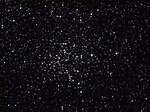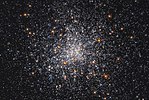This is a list of NGC objects 1001–2000 from the New General Catalogue (NGC). The astronomical catalogue is composed mainly of star clusters, nebulae...
143 KB (492 words) - 21:14, 7 January 2025
New General Catalogue (redirect from NGC object)
of Stars (abbreviated NGC) is an astronomical catalogue of deep-sky objects compiled by John Louis Emil Dreyer in 1888. The NGC contains 7,840 objects...
13 KB (1,586 words) - 17:10, 7 September 2024
galaxies. List of NGC objects (1–1000) List of NGC objects (1001–2000) List of NGC objects (2001–3000) List of NGC objects (3001–4000) List of NGC objects (4001–5000)...
2 KB (262 words) - 21:13, 7 January 2025
Mayall II (redirect from NGC-224-G1)
Mayall II, also known as NGC-224-G1, SKHB 1, GSC 2788:2139, HBK 0-1, M31GC J003247+393440 or Andromeda's Cluster, is a globular cluster orbiting M31,...
5 KB (501 words) - 19:52, 11 November 2024
Messier 38 (redirect from NGC 1912)
Messier 38 or M38, also known as NGC 1912 or Starfish Cluster, is an open cluster of stars in the constellation of Auriga. It was discovered by Giovanni...
7 KB (519 words) - 17:25, 23 July 2024
Sh 2-279 (redirect from NGC 1973, NGC 1975 and NGC 1977)
comprises three NGC nebulae, NGC 1973, NGC 1975, and NGC 1977 that are divided by darker nebulous regions. It also includes the open cluster NGC 1981. The brightest...
9 KB (1,054 words) - 16:22, 1 January 2025
Orion Nebula (redirect from NGC 1976)
The Orion Nebula (also known as Messier 42, M42, or NGC 1976) is a diffuse nebula situated in the Milky Way, being south of Orion's Belt in the constellation...
45 KB (4,806 words) - 13:31, 21 December 2024
NGC 1893 is an open cluster in the constellation Auriga. It is about 12,400 light years away. The star cluster is embedded in the Tadpole Nebula (HII...
5 KB (413 words) - 07:52, 21 July 2024
200 planetary nebulae, including Minkowski 2-9, and a dwarf galaxy near NGC 541, known as Minkowski's object, is named after him. Minkowski, R (1960)...
6 KB (469 words) - 04:27, 7 December 2024
NGC 1512 is a barred spiral galaxy approximately 38 million light-years away from Earth in the constellation Horologium. The galaxy displays a double...
5 KB (451 words) - 22:54, 14 December 2024
Messier 79 (redirect from NGC 1904)
Messier 79 (also known as M79 or NGC 1904) is a globular cluster in the southern constellation Lepus. It was discovered by Pierre Méchain in 1780 and...
6 KB (640 words) - 17:12, 23 November 2024
NGC 1788 is a reflection nebula in the constellation of Orion. It is rather sharply defined on its southwest perimeter where it is flanked by the dark...
2 KB (121 words) - 03:56, 15 July 2024
galaxy NGC 1642 is part of the NGC 1762 group (also known as LGG 120) that includes at least 27 galaxies, including IC 392, NGC 1590, NGC 1633, NGC 1691...
4 KB (255 words) - 02:21, 31 December 2024
cloud 3 (OMC-3) Orion molecular cloud 4 (OMC-4) NGC 1981 NGC 1999 the Waterfall nebula (HH-222), above NGC 1999 HH 34 a Herbig–Haro object with symmetric...
14 KB (1,568 words) - 00:12, 17 June 2024
Messier 36 (redirect from NGC 1960)
Messier 36 or M36, also known as NGC 1960 or the Pinwheel Cluster, is an open cluster of stars in the somewhat northern Auriga constellation. It was discovered...
9 KB (800 words) - 17:23, 23 July 2024
NGC 1947 is a peculiar lenticular galaxy in the constellation Dorado. The galaxy lies about 50 million light years away from Earth, which means, given...
6 KB (615 words) - 06:39, 28 September 2024
Messier 43 (redirect from NGC 1982)
Messier 43 or M43, also known as De Mairan's Nebula and NGC 1982, is a star-forming nebula with a prominent H II region in the equatorial constellation...
6 KB (567 words) - 13:29, 17 August 2024
of the NGC 1762 Group (also known as LGG 120) that includes at least 27 galaxies, including IC 392, NGC 1633, NGC 1642, NGC 1691, NGC 1713, NGC 1719, and...
4 KB (236 words) - 01:05, 16 December 2024
galaxy NGC 1620 is part of the NGC 1589 Group (also known as LGG 117) that includes at least 8 other galaxies: NGC 1586, NGC 1587, NGC 1588, NGC 1589,...
5 KB (327 words) - 01:24, 14 December 2024
NGC 1761 (also known as GC 980, JH 2710, LH 9) is an open cluster in the Dorado constellation in the Large Magellanic Cloud. It encompasses a group of...
3 KB (221 words) - 16:17, 15 August 2024
NGC 1980 (also known as OCL 529, Collinder 72 and The Lost Jewel of Orion) is a young open cluster associated with an emission nebula in the constellation...
3 KB (198 words) - 18:22, 15 May 2024
NGC 1819 is a lenticular galaxy in the constellation of Orion. It was discovered on December 26, 1885, by American astronomer Lewis A. Swift. This galaxy...
8 KB (372 words) - 23:20, 3 November 2024
NGC 1530 is a barred spiral galaxy in the northern constellation of Camelopardalis. It was discovered by German astronomer W. Tempel in 1876. Danish astronomer...
17 KB (1,244 words) - 06:31, 3 September 2023
Lambda Persei. The same telescope field contains the clusters NGC 1528 and NGC 1545. NGC 1513 was discovered in 1790 by the German-British astronomer William...
8 KB (611 words) - 04:08, 27 August 2024
NGC 1511 is a barred spiral galaxy in the constellation of Hydrus. Its velocity with respect to the cosmic microwave background is 1341 ± 5 km/s, which...
6 KB (495 words) - 04:19, 16 December 2024
NGC 1535, also known as Cleopatra's Eye, is a planetary nebula in the constellation of Eridanus, discovered by William Herschel on February 1, 1785. It...
4 KB (307 words) - 12:04, 18 July 2024
Crab Nebula (redirect from NGC 1952)
The Crab Nebula (catalogue designations M1, NGC 1952, Taurus A) is a supernova remnant and pulsar wind nebula in the constellation of Taurus. The common...
51 KB (5,845 words) - 02:47, 10 December 2024
NGC 1616 is an intermediate spiral galaxy located around 213 million light-years away in the constellation Caelum. NGC 1616 was discovered on October 24th...
2 KB (122 words) - 19:12, 10 July 2024
NGC 1537 is an elliptical galaxy located around 64 million light-years away in the constellation Eridanus. NGC 1537 is south of the celestial equator and...
2 KB (112 words) - 15:23, 4 January 2025
NGC 1585 is a spiral galaxy in the constellation of Caelum. Its velocity with respect to the cosmic microwave background is 4,635 ± 31 km/s, which corresponds...
3 KB (200 words) - 02:58, 13 December 2024



























